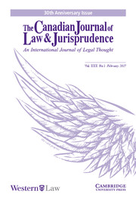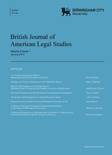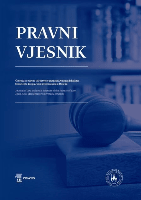
Revista de Estudos Constitucionais Hermeneutica e Teoria do Direito-RECHTD
Scope & Guideline
Unveiling Insights in Constitutional Theory
Introduction
Aims and Scopes
- Constitutional Theory and Human Rights:
The journal emphasizes the exploration of constitutional principles in relation to human rights, considering how legal frameworks can protect and promote these rights in diverse contexts. - Legal Pluralism and Transnational Law:
A core area of focus is the analysis of legal pluralism, particularly in the context of transnational law, which examines how different legal systems interact and influence each other, especially in post-colonial settings. - Impact of Technology on Law:
The journal investigates the implications of technological advancements, such as AI and digital transformation, on legal practices and the rule of law, highlighting the need for adaptive legal frameworks. - Social Justice and Equity:
There is a consistent emphasis on social justice issues, including the rights of marginalized communities, gender equality, and the role of law in promoting equitable access to resources and opportunities. - Judicial Discourse and Argumentation:
The journal addresses the importance of judicial reasoning and argumentation, exploring how courts interpret laws and the implications of their decisions on society. - Comparative Constitutional Law:
RECHTD engages in comparative analyses of constitutional systems, providing insights into the unique legal traditions and challenges faced by different countries.
Trending and Emerging
- Digital Rights and Privacy:
Recent publications have increasingly focused on digital rights, privacy, and data protection, highlighting the legal challenges posed by technological advancements and the need for robust legal safeguards. - Transitional Justice and Human Rights:
There is a growing emphasis on transitional justice, particularly in the context of post-conflict societies, exploring how legal frameworks can address past injustices and promote human rights. - Environmental Law and Sustainability:
The emergence of themes related to environmental law, particularly the rights to a healthy environment and sustainability, reflects a rising awareness of ecological issues within the legal discourse. - Social Movements and Legal Change:
The interaction between social movements and legal reform is increasingly explored, showcasing how grassroots activism influences constitutional norms and legal practices. - AI and the Future of Law:
The implications of artificial intelligence and emerging technologies on the legal system are gaining traction, indicating a forward-looking approach to the challenges of modern jurisprudence.
Declining or Waning
- Traditional Legal Doctrines:
There seems to be a decreasing emphasis on classical legal doctrines and theories that do not engage with contemporary issues, as the journal shifts towards more dynamic and relevant topics. - Purely Theoretical Legal Discussions:
The focus on abstract theoretical discussions without practical applications has waned, indicating a preference for research that connects theory with real-world legal challenges. - Historical Legal Analysis:
The analysis of historical legal frameworks and their implications is less prevalent, reflecting a trend towards more current and pressing legal issues in the journal's publications.
Similar Journals

Revista Latinoamericana de Derecho Social
Navigating the Legal Landscape for a Just SocietyRevista Latinoamericana de Derecho Social, published by the Nacional Autónoma de México, Instituto de Investigaciones Jurídicas, is a vital academic resource in the field of Law, particularly focused on social legal issues in the Latin American context. With an ISSN of 1870-4670 and an E-ISSN of 2448-7899, this journal has been actively contributing to legal scholarship since its inception in 2016 and is set to continue until 2024. Although it currently holds a Q4 ranking in the 2023 Law category and is positioned within the 10th percentile of Scopus rankings, the journal offers invaluable insights and rigorous analysis on legal frameworks and practices affecting social justice in Mexico and beyond. Though it operates as a regular publication, researchers and practitioners can access its articles to enhance their understanding of contemporary legal challenges. We encourage scholars, students, and legal professionals interested in social law and the interplay of legal systems in Latin America to consider this journal as a significant avenue for disseminating and engaging with critical legal research.

Canadian Journal of Law and Jurisprudence
Fostering Insightful Legal Scholarship for TomorrowCanadian Journal of Law and Jurisprudence, published by Cambridge University Press, serves as a pivotal platform in the field of legal studies, particularly recognized for its comprehensive exploration of jurisprudence in the context of Canadian law. While the journal operates without an open access model, its ISSN 0841-8209 and E-ISSN 2056-4260 ensure broad academic accessibility. Based in the United Kingdom, it has established a notable impact within its category, maintaining a Q3 ranking in Law according to the latest 2023 metrics. With its convergence of issues from 1996 to 2003, periods in 2007, and recently from 2012 to 2024, the journal embraces a rich historical context while addressing contemporary legal challenges. Ranked #439 out of 1025 in the social sciences category on Scopus, the journal is positioned within the 57th percentile, highlighting its significance and influence in legal scholarship. Aimed at researchers, professionals, and students, the Canadian Journal of Law and Jurisprudence is an essential resource for those seeking to deepen their understanding of the evolving landscape of law and its philosophical underpinnings.

YALE LAW JOURNAL
Fostering Dialogue in the Heart of LawYale Law Journal, founded in 1891 and published by Yale Law J Co Inc, stands as a preeminent peer-reviewed legal journal in the United States, recognized for its rigorous scholarship and influential contributions to legal theory and practice. With an impact factor that underscores its peerless reputation, this journal maintains a Q1 ranking in the law category, situating it in the top tier of legal publications globally, as indicated by its Scopus rank of 66 out of 1025, placing it in the 93rd percentile. The journal publishes a comprehensive range of articles, essays, and reviews that address vital topics across the legal spectrum, aiming to foster dialogue and innovation within the legal community. Although it does not offer open access, its meticulous curation of content ensures that researchers, practitioners, and students alike have access to the most impactful legal scholarship. Located at 401-A Yale Station, New Haven, CT 06520, the journal continues to shape the legal landscape, making it an essential resource for anyone engaged in the study or practice of law.

British Journal of American Legal Studies
Navigating the Evolving Landscape of American Legal ThoughtBritish Journal of American Legal Studies is a dynamic open-access journal published by SCIENDO, focusing on the intricate and evolving landscape of American legal studies. Since its inception in 2016, this journal has aimed to provide a platform for the dissemination of research that enhances understanding of U.S. law in a global context, promoting interdisciplinary dialogue among legal scholars, practitioners, and policy-makers. With an ISSN of 2049-4092 and an E-ISSN of 2719-5864, the journal holds a Q4 category in Law according to the 2023 rankings, reflecting its commitment to nurturing legal scholarship despite being positioned in the lower quartile among its peers. The journal's presence in Scopus, ranked #927 out of 1025 in the Social Sciences _ Law category with a percentile of 9th, demonstrates its emerging role in the field. As an open access publication, it is dedicated to making research freely available to ensure that findings and discussions reach a broader audience. The British Journal of American Legal Studies is not only instrumental for researchers and students keen on American law but also serves as an essential resource for professionals looking to stay informed about current legal challenges and developments.

Revista Academica da Faculdade de Direito do Recife
Advancing Legal Scholarship for a Global AudienceRevista Academica da Faculdade de Direito do Recife is a premier open-access journal published by UNIV FED PERNAMBUCO, dedicated to advancing scholarly discourse in the field of law. Since its inception, the journal has provided a platform for legal researchers, professionals, and students to explore and disseminate high-quality research pertinent to the Brazilian legal landscape and beyond. The journal, bearing the ISSN 1980-3087 and E-ISSN 2448-2307, operates under an open-access model established in 2011, ensuring broad accessibility to its articles and promoting global dialogue in legal scholarship. With its commitment to quality and rigorous peer review, the Revista Academica is positioned as a vital resource within the legal community, fostering academic collaboration and innovation.

DUKE LAW JOURNAL
Exploring the nexus of law and society.DUKE LAW JOURNAL is a premier scholarly journal published by Duke University, dedicated to advancing the field of law through rigorous research and critical analysis. With an ISSN of 0012-7086 and an E-ISSN of 1939-9111, this distinguished journal has established itself as a vital resource for legal scholars, practitioners, and students alike. As a member of the top quartile (Q1) in Law for 2023 and ranking 267 out of 1025 in the Scopus database, the journal showcases high-impact articles that contribute to the contemporary discourse on legal theory, practice, and reform. While it does not currently offer open access, its rich archive since 1978 provides invaluable insights into significant legal developments in the United States and beyond. The DUKE LAW JOURNAL serves not only as a repository of knowledge but also as a forum for diverse perspectives, making it an essential tool for anyone engaged in the legal profession or academia.

Quaestio Iuris
Championing Open Access to Legal KnowledgeQuaestio Iuris is a distinguished academic journal that has been making significant strides in the field of legal studies since its establishment. Published by the Universidade do Estado do Rio de Janeiro, this Open Access journal, operational since 2005, fosters a dynamic platform for the dissemination of innovative research, critical analysis, and scholarly discourse in various branches of law. With its ISSN 1807-8389 and E-ISSN 1516-0351, Quaestio Iuris is committed to enriching the legal academic landscape, ensuring that valuable insights are accessible to researchers, professionals, and students worldwide. The journal is dedicated to exploring contemporary legal challenges and contributing to the evolution of legal theory and practice, all while maintaining the highest standards of academic integrity. It is positioned to serve as an essential resource for those who aim to engage with the intricacies of legal scholarship.

German Law Journal
Bridging Tradition and Innovation in LawGerman Law Journal, published by Cambridge University Press, stands as a leading open-access platform for scholarly discourse in the field of law, having made its content freely available since 2019. With an impressive impact factor that places it in the Q1 category for Law as of 2023, and a robust Scopus ranking of #164 out of 1025 in the social sciences category, this journal is recognized for its high-quality research and significant contributions to legal scholarship. The journal encompasses a wide array of topics pertinent to the German legal system, European Union law, and comparative legal studies, thus catering to researchers, legal practitioners, and students alike. Located in the heart of the UK, at Edinburgh Building, Shaftesbury Rd, Cambridge, this journal not only fosters academic engagement but also promotes interdisciplinary dialogues that enrich the understanding of legal principles in an evolving global context. Emphasizing accessibility and high academic standards, the German Law Journal serves as an essential resource for those seeking to explore and contribute to contemporary legal discussions.

Revista Brasileira de Direito
Bridging Theory and Practice in the Legal RealmRevista Brasileira de Direito is a prominent open-access journal dedicated to advancing the field of legal studies in Brazil and beyond. Published by FAC MERIDIONAL-IMED, this journal has been providing a platform for scholarly discussion and research dissemination since its transition to open access in 2013. With an ISSN of 1807-1228 and an E-ISSN of 2238-0604, the Revista Brasileira de Direito focuses on a wide-ranging scope that includes but is not limited to constitutional law, international law, civil rights, and legal theory. This journal is crucial for researchers, legal professionals, and students seeking to stay informed about contemporary legal debates, case studies, and innovative legal solutions. Based in Passo Fundo, Brazil, the journal aims to contribute significantly to the academic landscape by fostering a collaborative environment for the exchange of ideas and critical analyses within the legal community.

Pravni Vjesnik
Cultivating Insightful Legal Perspectives.Pravni Vjesnik is a peer-reviewed academic journal published by the Pravni Fakultet Sveučilišta Josipa Jurja Strossmayera & Osijek, primarily focusing on the field of law within the social sciences. Since transitioning to an Open Access model in 2016, the journal has broadened its accessibility, allowing researchers, professionals, and students to engage with diverse legal scholarship without subscription barriers. With an ISSN of 0352-5317 and an E-ISSN of 1849-0840, Pravni Vjesnik plays a crucial role in disseminating knowledge and fostering discourse in the legal community, particularly within the context of the Croatian legal system and broader European legal frameworks. Although it holds a rank of #760 out of 1025 in the Scopus database, placing it in the 25th percentile of law journals, its commitment to quality and relevance ensures its importance as a resource for rigorous academic inquiry. The journal's scope is anticipated to expand from 2019 to 2024, promoting ongoing research in contemporary legal issues. This dedication to publishing comprehensive and impactful studies makes Pravni Vjesnik an essential platform for those involved in the legal field.